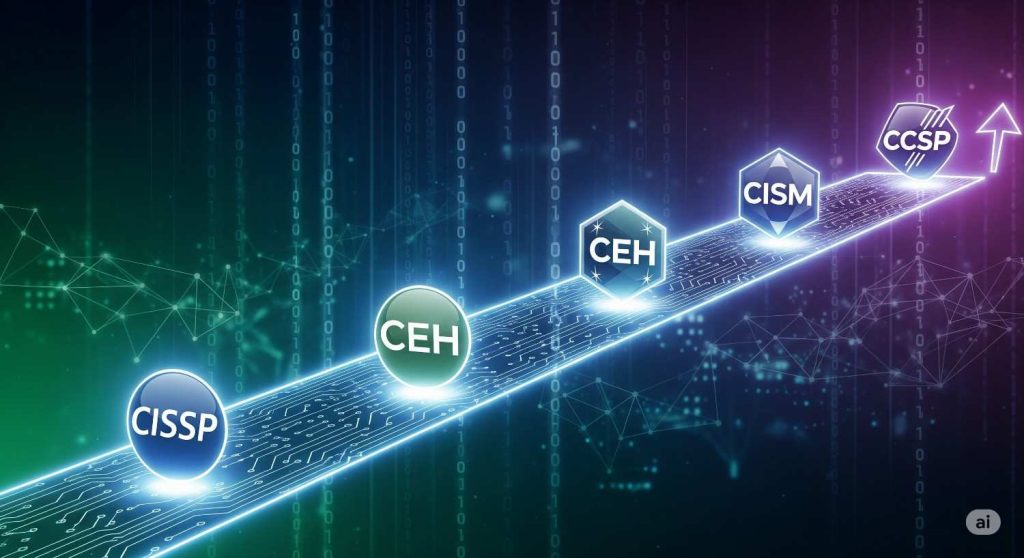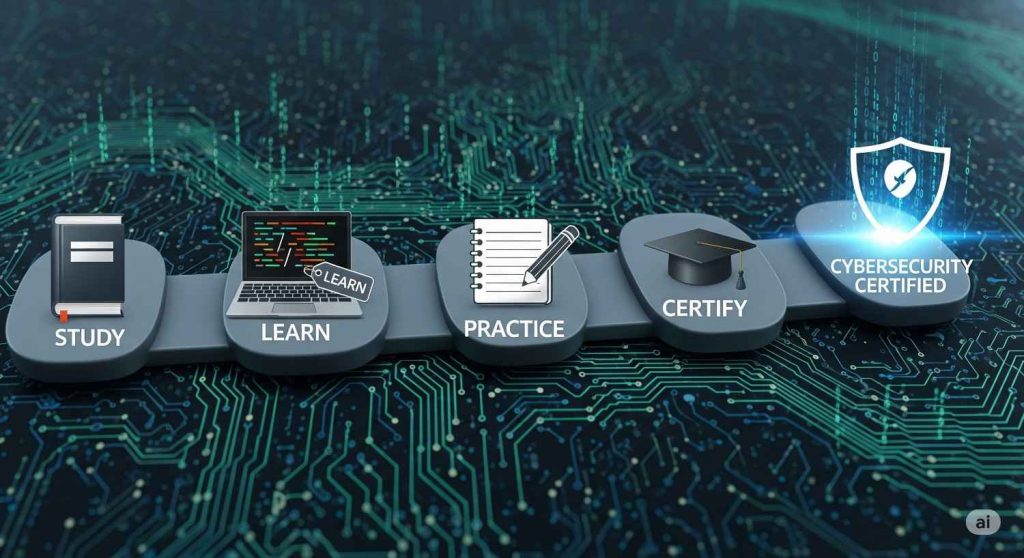Explore the top cybersecurity certifications in 2026, including CISSP, CEH, CISM, and CCSP. Learn which certification suits your career path and boosts your salary potential.
Introduction
In 2026, cybersecurity certifications continues to be one of the most in-demand career paths worldwide. With businesses increasingly relying on digital infrastructure and facing growing cyber threats, organizations are actively seeking skilled cybersecurity professionals. If you want to establish a long-term, lucrative career in IT security, earning cybersecurity certifications is one of the most effective ways to achieve your goals.
Certifications not only validate your expertise but also increase your chances of landing high-paying roles, advancing into managerial positions, and gaining global recognition. Whether you’re a beginner, an IT professional looking to upskill, or an experienced security specialist aiming for leadership roles, there is a certification suited for every stage of your career.

Why Cybersecurity Certifications Are Important
Cybersecurity certifications are not just certificates—they are proof of your skills, knowledge, and readiness to tackle real-world security challenges. Here are the main reasons they are important in 2026:
1. Skill Validation
Employers often look for certified professionals as certifications prove that you have the required skills. With certifications, you can demonstrate competence in areas such as network security, ethical hacking, risk management, and cloud security.
2. Higher Salary Potential
cybersecurity certifications professionals generally earn higher salaries compared to non-certified peers. According to industry reports, certifications like CISSP or CEH can boost your earning potential by 20–30%.
3. Career Advancement Opportunities
Certifications make you eligible for advanced roles such as Security Analyst, Penetration Tester, Security Architect, and Chief Information Security Officer (CISO). Many management positions in cybersecurity now require a combination of experience and certification.
4. Global Recognition
Most cybersecurity certifications are recognized internationally. Certifications like CISSP, CEH, and CCSP are valued across countries, giving you opportunities to work globally.
5. Updated Knowledge
Certification programs often include updated content reflecting current cyber threats, best practices, and emerging technologies. This keeps your knowledge relevant and in line with industry standards.

Top Cybersecurity Certifications in 2026
1. Certified Information Systems Security Professional (CISSP)
Overview:
CISSP is widely regarded as the gold standard for experienced cybersecurity professionals. It is designed for individuals who want to prove their expertise in security management and leadership roles.
Focus Areas:
- Security and risk management
- Asset security
- Security engineering
- Communication and network security
- Identity and access management
- Security operations
Ideal For:
Security managers, security analysts, IT architects, and professionals aiming for leadership positions.
Benefits:
- High earning potential
- Global recognition
- Strong career advancement opportunities
- Credibility in the industry
Preparation Tips:
- Take CISSP training courses from certified providers
- Read official study guides and practice exams
- Gain hands-on experience in different security domains
2. Certified Ethical Hacker (CEH)
Overview:
CEH is ideal for professionals who want to specialize in ethical hacking. It teaches you how to think like a hacker to identify system vulnerabilities and prevent cyber attacks.
Focus Areas:
- Footprinting and reconnaissance
- Scanning networks
- System hacking
- Malware threats
- Social engineering
- Web application hacking
Ideal For:
Penetration testers, ethical hackers, security consultants, and network security professionals.
Benefits:
- Practical, hands-on learning experience
- Prepares you for real-world penetration testing
- Recognized by top cybersecurity firms
Preparation Tips:
- Complete CEH official training
- Set up virtual labs to practice hacking techniques
- Stay updated with current vulnerabilities and exploits
3. CompTIA Security+
Overview:
CompTIA Security+ is a foundational certification that provides entry-level knowledge of cybersecurity. It is ideal for beginners or IT professionals transitioning into security roles.
Focus Areas:
- Network security fundamentals
- Threats, attacks, and vulnerabilities
- Identity and access management
- Cryptography basics
- Risk management
Ideal For:
Entry-level security analysts, IT administrators, and anyone looking to start a career in cybersecurity.
Benefits:
- Beginner-friendly
- Globally recognized certification
- Prepares for advanced security certifications
Preparation Tips:
- Use CompTIA’s official study guide and practice exams
- Gain hands-on experience with networking and security tools
- Join online forums and communities to discuss study topics

4. Certified Information Security Manager (CISM)
Overview:
CISM focuses on security management and governance, making it suitable for professionals who want leadership roles in IT security.
Focus Areas:
- Information security governance
- Risk management and compliance
- Incident management
- Security program development and management
Ideal For:
Security managers, IT consultants, risk analysts, and professionals aiming for managerial roles.
Benefits:
- Leadership-focused certification
- Highly respected by employers
- Opens doors to management-level positions
Preparation Tips:
- Review the official ISACA CISM review manual
- Attend formal training sessions or workshops
- Gain experience in managing IT security programs
5. Certified Cloud Security Professional (CCSP)
Overview:
CCSP is designed for professionals specializing in cloud security. With more organizations migrating to cloud platforms, CCSP is increasingly valuable in 2026.
Focus Areas:
- Cloud architecture and design
- Cloud data security
- Cloud platform security
- Compliance and legal issues
Ideal For:
Cloud security engineers, security architects, IT consultants, and professionals responsible for cloud security.
Benefits:
- Recognized globally in cloud security
- Addresses growing demand for cloud security experts
- Enhances career prospects in cloud-based organizations
Preparation Tips:
- Study official CCSP materials
- Gain hands-on experience with cloud platforms like AWS, Azure, or Google Cloud
- Practice cloud security scenarios and simulations

How to Choose the Right Cybersecurity Certifications
Choosing the right certification depends on your career goals, experience, and interests. Here are some tips to help you decide:
- Career Goals:
- If you want management roles, go for CISSP or CISM.
- If you prefer hands-on technical roles, CEH or CCSP is ideal.
- Experience Level:
- Beginners should start with CompTIA Security+ or entry-level courses.
- Experienced professionals can pursue CISSP, CISM, or CCSP.
- Industry Recognition:
- Choose certifications recognized globally for better career opportunities.
- Skill Relevance:
- Focus on certifications that align with current cybersecurity trends, such as cloud security, ethical hacking, and risk management.

Steps to Prepare for Cybersecurity Certifications
- Take Online Courses and Training: Platforms like Udemy, Coursera, and official certification websites offer structured learning.
- Gain Hands-On Experience: Use labs, virtual environments, and simulations to practice real-world scenarios.
- Join Cybersecurity Communities: Forums and social media groups provide valuable insights, tips, and resources.
- Use Practice Exams: Regularly test your knowledge with mock exams to identify weak areas.
- Stay Updated: Cybersecurity is dynamic; keep up with the latest threats, vulnerabilities, and tools.
Career Opportunities After Certification
After earning a cybersecurity certification in 2026, several high-demand career paths are open to you:
- Security Analyst
- Ethical Hacker / Penetration Tester
- Security Architect
- Cloud Security Engineer
- IT Security Consultant
- Chief Information Security Officer (CISO)
Certified professionals enjoy competitive salaries, global job opportunities, and rapid career growth.
Conclusion
Cybersecurity certifications in 2026 are essential for anyone looking to succeed in IT security. Certifications like CISSP, CEH, CompTIA Security+, CISM, and CCSP provide skill validation, higher salary potential, and career advancement opportunities.
Whether you are a beginner, an IT professional, or a security manager, investing in the right certification can transform your career. Combine certification with hands-on experience, continuous learning, and staying updated with emerging technologies to stay competitive in the fast-growing field of cybersecurity.
Start your certification journey today and become a highly
Know more related:
AI in Education 2025: The Future of Smart Classroom







